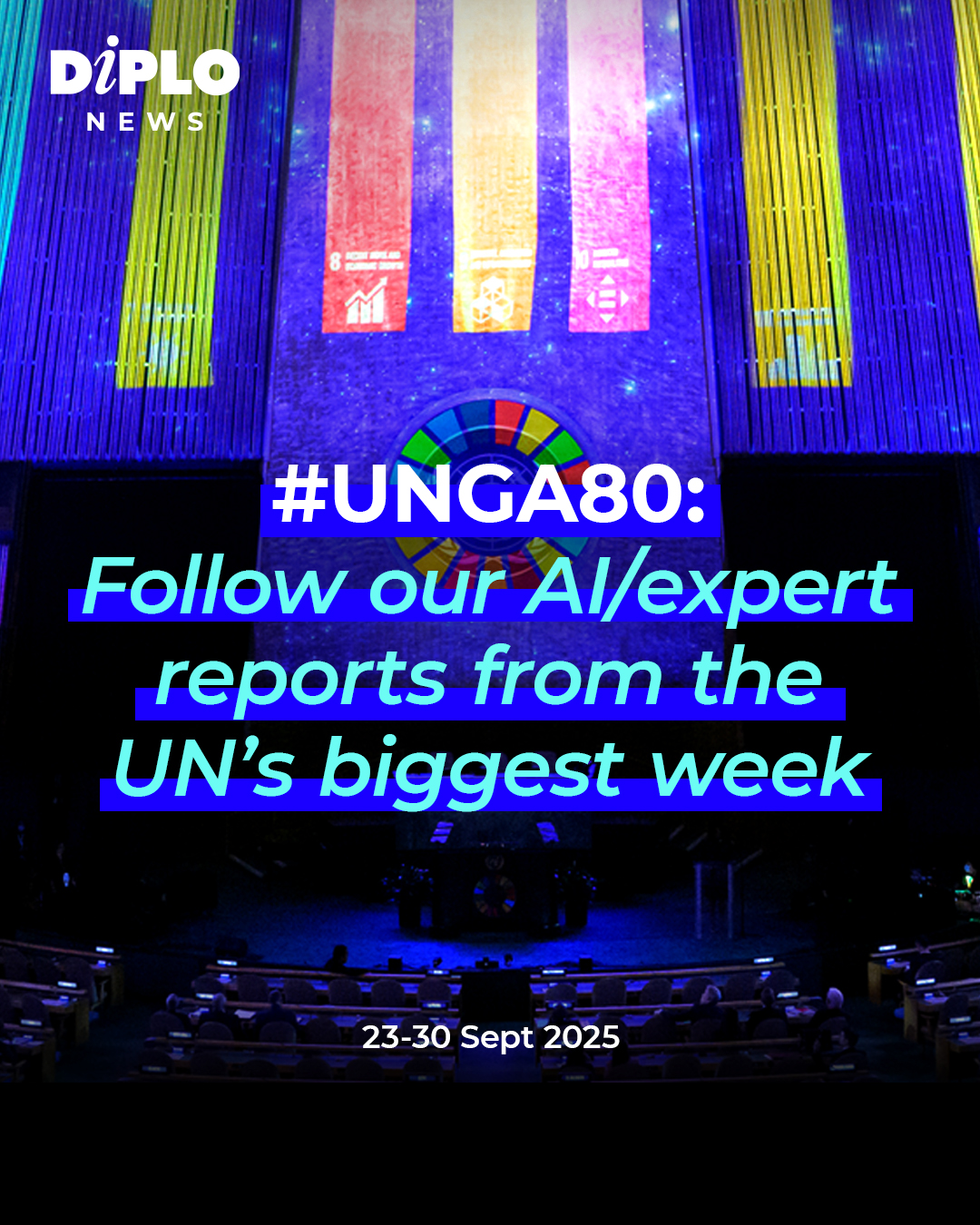
Welcome to the fifth daily report from the General Debate at the 80th session of the UN General Assembly (UNGA80). Our daily hybrid AI–human reports bring you a concise overview of how world leaders are framing the digital future.
Day 6 discussion centred on the transformative potential and urgent risks of AI, emphasising that while AI can boost development, health, education, and productivity—especially in least developed countries—it must be governed responsibly to prevent inequality, bias, and insecurity. Calls for a global AI framework were echoed in various statements, alongside broader appeals for inclusive digital cooperation, accelerated technology transfer, and investment in infrastructure, literacy, and talent development. Speakers warned that digital disruption is deepening geopolitical divides, with smaller and developing nations demanding a voice in shaping emerging governance regimes. Bridging the digital divide, advancing secure and rights-based technologies, and protecting against cybercrime were framed as essential
To keep the highlights clear and accessible, we leave them in bullet points — capturing the key themes and voices as they emerge.
Artificial intelligence
- Responsible AI governance
- AI presents both unprecedented opportunities and profound challenges, and if harnessed responsibly, it can accelerate development, improve health and education, and unlock economic growth. Without clear governance, AI risks deepening inequalities and undermining security. A global framework is called for to ensure AI is ethical, inclusive, and accessible to all nations, enabling it to serve as a force for development rather than division. (Malawi)
- AI is a tool that must be harnessed for all humankind, equally in a controlled manner, as opportunities are vast, including for farmers, city planning, and disaster risk management. (President of the General Assembly)
- The risks of AI are becoming more prevalent, and age-old biases are being perpetuated by algorithms, as seen in the targeting of women and girls by sexually related deepfakes. (President of the General Assembly)
- Discussions on AI lend further prudence to the argument that ‘we are better together,’ and few would be comfortable leaving the benefits or risks of this immense resource in the hands of a few. (President of the General Assembly)
International cooperation remains essential to establishing comprehensive regulations governing the use and development of AI. (Timor-Leste)
AI for development and growth
- The transformative potential of science, technology, and AI, should be harnessed for national and global development. Malawi is optimistic that AI will usher in a new era of enhanced productivity for its citizens, helping to propel the country’s development trajectory. (Malawi)
- Advancing AI and digital capabilities in LDCs is imperative, requiring investment in digital infrastructure and enhancing digital literacy, implementing e-government initiatives, promoting AI research and innovation, cultivating talent and establishing a policy framework. (Timor-Leste)
- Making AI a technology that benefits all is an important issue agreed upon in the Global Digital Compact, which also covers peace and security, sustainable development, climate change, and digital cooperation. (Djibouti)
- Canada emphasised national strength in AI, clean technologies, critical minerals and digital innovation. (Canada)
Global digital governance
- Nepal advocates for a global digital cooperation framework that ensures access to infrastructures, digital literacy, and data protection for all. (Nepal)
- Digital transformation and digital and technological disruption are converging with other crises, such as climate catastrophe and widening inequality. (Malawi, Nepal, Holy See) Digital transformation demands renewed collective action. A renewed collective resolve to fortify the founding values of the UN, and a revitalised, transformed UN are needed. (Malawi, Nepal, Holy See)
Digital technologies and development
Addressing the digital divide and inequality
- Rapid technological, geopolitical, and environmental shifts are ushering in a new, multipolar global order that offers both opportunities and risks, and insisted that smaller states must not be sidelined but fully heard in shaping it. (Benin)
- The development gap has expanded between the North and the South despite technological revolutions. (Algeria)
- Digital transformations deserve urgent global attention, and technology must be inclusive, secure, and rights-based. (Nepal)
- It is crucial to narrow the digital divide within and among countries to create a peaceful and equitable society. (Nepal)
- Policies and programmes for technologies and progress should be within the reach of everyone for the good of everyone. (Nicaragua)
Technology transfer
- The gap between rich and poor nations continues to widen, and developing countries struggle with limited technology transfer and low productivity. (Malawi)
- The full and effective implementation of the Paris Agreement should include ensuring equitable access to sustainable technologies. (Malawi)
- The international community is called upon to foster an environment that supports inclusive growth and harnesses the transformative potential of science and technology, and AI. (Malawi)
- A comprehensive and inclusive approach is needed to address the pressing challenges in the Mediterranean, making economic development on the Southern Front a shared priority through investment and technology transfer. (Algeria)
- Technology transfer must be accelerated and scaled up, with calls for scaled-up, predictable and accessible technology transfer and capacity building for countries on the front line, particularly LDCs. (Nepal)
Cybersecurity
- Safeguarding cybersecurity is imperative alongside the advancement of AI and digital capabilities in LDCs. (Timor-Leste)
- Russia has sought to undermine Moldova’s sovereignty through illicit financing, disinformation, cyberattacks, and voter intimidation. (Moldova)
For other topics discussed, head over to our dedicated UNGA80 page, where you can explore more insights from the General Debate.

